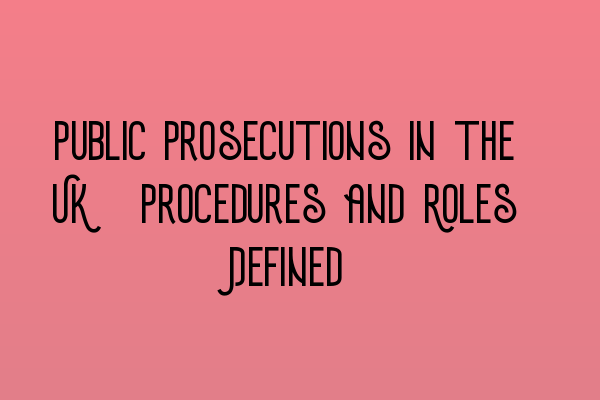Public Prosecutions in the UK: Procedures and Roles Defined
When it comes to criminal law in the United Kingdom, the role of public prosecutions is paramount. Public prosecutions ensure that justice is served and that those who commit crimes are held accountable for their actions. In this article, we will explore in-depth the procedures and roles defined within the framework of public prosecutions in the UK.
The Crown Prosecution Service (CPS)
At the heart of the public prosecutions system in the UK is the Crown Prosecution Service (CPS). The CPS is responsible for deciding whether or not to prosecute individuals or organizations suspected of committing crimes. They work closely with the police and other law enforcement agencies to gather evidence and build a robust case.
As a vital component of the criminal justice system, the CPS operates independently from the government and has the authority to make decisions free from political influence. This ensures that prosecutions are conducted impartially and without bias.
The CPS is led by the Director of Public Prosecutions (DPP), who is appointed by the Attorney General. The DPP oversees the work of the CPS and is responsible for maintaining the high standards of professional conduct and performance within the organization.
The Role of the Prosecutor
The prosecutor, whether they are a lawyer from the CPS or a private practitioner, plays a critical role in the public prosecutions process. Their primary duty is to present the evidence against the accused in court and argue for their guilt.
To successfully prosecute a case, the prosecutor must meticulously gather evidence, interview witnesses, analyze legal statutes, and prepare persuasive arguments. Their role is to present a compelling case that convinces the court of the defendant’s guilt beyond a reasonable doubt.
Throughout the proceedings, the prosecutor must adhere to the Code for Crown Prosecutors, a set of guidelines issued by the Director of Public Prosecutions. The Code sets out the principles that prosecutors must follow when making decisions about whether or not to prosecute, what charges to bring, and how to conduct the prosecution.
The Role of the Defence
In the adversarial system of law in the UK, the defense plays a crucial role in ensuring a fair and balanced trial. The defense lawyer’s duty is to represent the accused and challenge the prosecution’s case by scrutinizing the evidence and presenting counter-arguments.
A fair trial requires robust representation from the defense to ensure that the accused’s rights are protected and that justice is upheld. The defense lawyer’s role is to scrutinize the evidence presented, cross-examine witnesses, and present a defense strategy that seeks to establish reasonable doubt.
The Role of the Court
The court plays the pivotal role of adjudicating the case and making a final determination of guilt or innocence. The judge and jury (where applicable) carefully consider the evidence presented by the prosecution and scrutinize the arguments put forward by both the prosecution and the defense.
The court ensures that the trial is conducted fairly, that the rules of evidence are followed, and that legal procedures are upheld. They are responsible for instructing the jury on matters of law and ensuring that the trial is conducted in accordance with established legal principles.
Ultimately, it is the court that decides whether to convict or acquit the accused based on the evidence and arguments presented during the trial.
Conclusion
Understanding the procedures and roles defined within the system of public prosecutions in the UK is vital for anyone involved in criminal law. The Crown Prosecution Service, prosecutors, defense lawyers, and the court all play integral roles in ensuring justice is served and the rule of law is upheld.
For more information about criminal law and related topics, be sure to check out our Legal Representation for Delaware LLCs in the UK: Expert Advice and Ensuring Ethical Business Practices: Delaware’s Code of Conduct articles.
